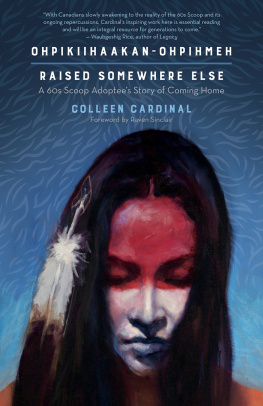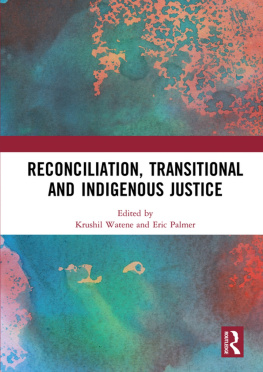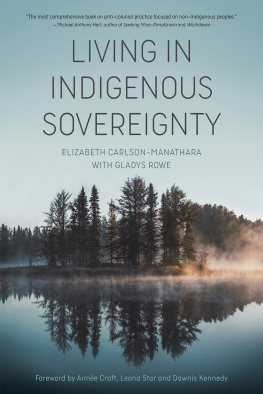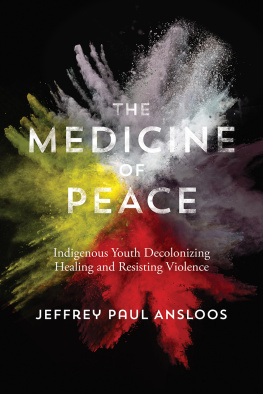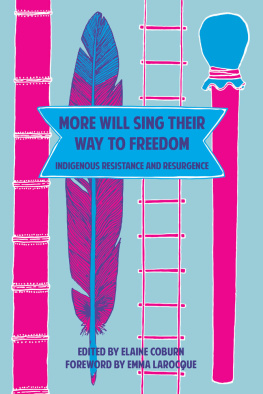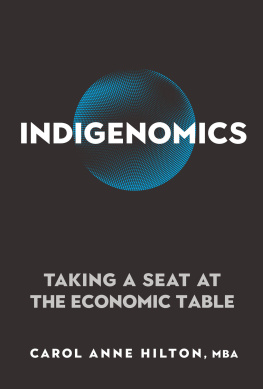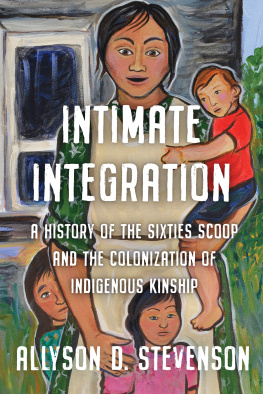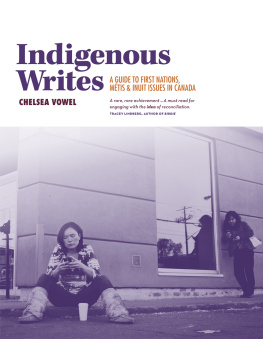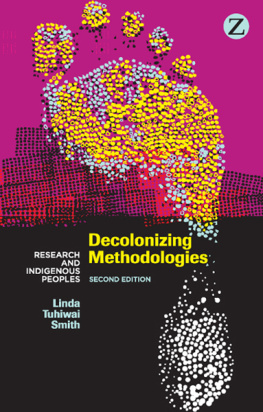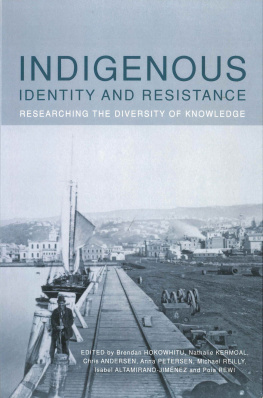OHPIKIIHAAKAN-OHPIHMEH
RAISED SOMEWHERE ELSE
OHPIKIIHAAKAN-OHPIHMEH
RAISED SOMEWHERE ELSE
A 60s Scoop Adoptees Story of Coming Home
Colleen Cardinal
Foreword by Raven Sinclair

Roseway Publishing
an imprint of Fernwood Publishing
Halifax & Winnipeg
Copyright 2018 Colleen Cardinal
All rights reserved. No part of this book may be reproduced or transmitted
in any form by any means without permission in writing from the publisher,
except by a reviewer, who may quote brief passages in a review.
Editing: Raven Sinclair and Jane Butler
Cover image: Blessings by Christopher Rowland
Design: Tania Craan
eBook: tikaebooks.com
Printed and bound in Canada
Published by Roseway Publishing
an imprint of Fernwood Publishing
32 Oceanvista Lane, Black Point, Nova Scotia, B0J 1B0
and 748 Broadway Avenue, Winnipeg, Manitoba, R3G 0X3
www.fernwoodpublishing.ca/roseway
Fernwood Publishing Company Limited gratefully acknowledges the financial support of the Government of Canada, the Canada Council for the Arts, the Province of Manitoba, the Province of Nova Scotia and Arts Nova Scotia.

Library and Archives Canada Cataloguing in Publication
Cardinal, Colleen, author
Ohpikiihaakan-ohpihmeh = Raised somewhere else: a 60s Scoop
adoptees story of coming home / Colleen Cardinal.
Issued in print and electronic formats.
ISBN 978-1-77363-020-5 (softcover).ISBN 978-1-77363-021-2 (EPUB).
ISBN 978-1-77363-022-9 (Kindle)
1. Cardinal, Colleen. 2. Adopted childrenCanadaBiography.
3. Autobiographies. I. Title. II. Title: Raised somewhere else.
HV874.82.C37A3 2018 306.874092 C2017-907871-2
C2017-907872-0
Kiskisonaw kahkiiyaw ka-saakihaayaakik
We Remember All Our Loved Ones
THIS BOOK IS DEDICATED to all our Indigenous relations. It is for those who are missing or murdered, homeless, incarcerated, living and struggling with addiction, chronic pain, disease, poverty, and mental illness. It is for those experiencing and surviving systemic racism through media and policies meant to dehumanize, eradicate and erase our identity, our sovereignty and our ceremonies that connect us to the land our ancestors have lived on since time immemorial.
I honour my blood relatives, all of whom have been impacted by violent colonial policies created by the Canadian government, which separated, destroyed and traumatized our family and which still wreak havoc upon Indigenous children and families.
I dedicate this book to my late eldest sister, Eugenia (Gina) Charmaine Desa; my late mother Dolly Esther Cardinal ne Cryer; my late kokum Maggie Cryer; my maternal aunties June Cryer, Cecelia Cryer, Helen Cryer, Roseanne Cryer and Albertine Cryer; my maternal uncle Marvin Cryer; my paternal uncles Dennis, Bruce and Fred; my Aunt Yvonne; my late kokum Helen Jackson-Brettron; my nephew Stephen Allen Sawyer; and lastly my sister-in-law Lynn Minia Jackson, paternal aunty to my sons.

Gina, Dakota, Colleen
Foreword
by Raven Sinclair
T HE SIXTIES SCOOP IS a term that refers to the Indigenous child removal system in Canada that spans the late 1950s to the present day. Thousands of Indigenous children were adopted into white settler Canadian families, with most of those adoptions taking place in the 1960s and 1970s. Children were apprehended in large numbers. Some First Nations communities lost virtually all their children in certain age groups. Children were adopted and fostered into families of all sorts, and according to Justice Edwin Kimelman and Bridget Moran, a British Columbia social worker in the 1960s, homes were often not adequately assessed for suitability or safety. Some children were fortunate to find loving families, while many thousands of others suffered all forms of abuse and neglect as well as racism from within their adoptive family units. Bridget Moran (1992) stated that the BC child welfare system was the biggest contributor to child abuse in the province.
Colleens story is one among tens of thousands. What makes her story unique is that she has found the inner strength to write it down and share it with others. Her honesty in telling about the abuses and obstacles that confronted her at almost every step of her journey is evident on every page. Her story will draw you in immediately and you may find it difficult to put the book down because you begin to wonder what can possibly happen next. Her story does not sensationalize her experiences, even the horrific ones. She writes in a matter-of-fact way and the reader becomes a witness on the journey of her life to the present. The ride is occasionally frightening and sad, which makes the funny moments a welcome relief. As a witness, we get to understand how strength and courage can result from trauma, and we breathe a sigh of relief with Colleen as she emerges from some very dark times. We also get to see, with some awe, that she has become a shining light in her own right: a social justice advocate, community organizer extraordinaire, and a compassionate and loving mom and loyal friend.
While none of this justifies what Colleen had to go through, it does inspire us to re-evaluate the Indigenous child removal system in Canada. It also inspires our admiration for Colleen and the many others with similar experiences who not only survived but thrived in ways that show the incredible resilience and tenacity of the human spirit.
Tapeyihtamiwin
Reckoning
T HE ONLY THING IVE known about myself for the past twenty-eight years is that I am completely and utterly devoted to my children. I believe they saved my life. They kept me going when I so often wanted to give up. I would drag myself out of bed on countless mornings and have hope that things would change and get better one day. Everything I have done up until this point was to provide a better life for my children: my sobriety, leaving abusive relationships and going back to school so I could escape poverty and get off Ontario Works. I began having children when I was sixteen years old and still a child myself. I did not plan on having children but I am grateful for them every single day because their spirits chose me to be their mother.
This is my story of how I came to know who I am as n e hiiyew iskew , adopted and raised in a non-Indigenous household thousands of kilometres away from my territory. When I started to unravel my past and find out where I came from, it led to critical life changes and eventually to healing, but most importantly, it has led to peace and understanding.
I am not perfect by any means and have hurt and been violent to other people in my past. I have also been hurt and had extreme physical, sexual and emotional violence committed against me throughout my life. I have yelled, raged, screamed at the top of my lungs, thrown things, sworn at people, made racist and homophobic slurs, hated and wished horrible things for people who have hurt me. I have been jealous, irrational, emotional, selfish and even vain. I have also loved deeply, tenderly held my newborn babies, cried when my grandbabies were born, forgiven those who hurt me and inflicted abuse on me, cried and wept until my belly went into muscle spasms from the pain of grief. I have reconciled my pain with most of my abusers, walked away from toxic relationships, learned to love and respect myself, and finally, to extend the tenderness my children needed from me so badly.

